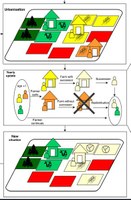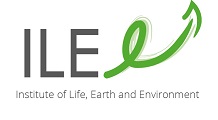Thesis Defence by Veronique Beckers
- https://ilee.unamur.be/events/thesis-defence-by-veronique-beckers
- Thesis Defence by Veronique Beckers
- 2020-01-17T13:00:00+01:00
- 2020-01-17T15:00:00+01:00
- When Jan 17, 2020 from 01:00 PM to 03:00 PM (Europe/Brussels / UTC100)
- Where "Aula van de Tweede Hoofdwet” at the KULeuven Thermotechnisch Instituut, Kasteelpark Arenberg 41, 3001 Heverlee
-
Add event to calendar
 iCal
iCal
High spatial resolution agent-based modelling at the country scale: an application of farming dynamics in Belgium
 In order to understand our complex world, different modelling approaches have been developped. One such approach, a promising simulation tool called agent-based modeling (ABM), simulates the interaction of complex systems and the involved agents. To simulate the behaviour of every individual agent in a system, a large amount of data is required. As a result, ABM has mostly been applied to small regions or has been largely generalized to allow the application to larger areas, resulting in a loss of detail. There is therefore a gap between the level for which ABM has been designed (the detailed, individual level) and the level that is relevant for policy making and planning (the regional or national level). This research aims to bridge that gap with the development of the "Agricultural Dynamics through Agent-based Modelling (ADAM)" tool. This model allows the simulation of an agricultural population and of the farmed area for an entire country, by integrating the main processes driving farmers' choices over their land. ADAM is a simple agent-based farming model that operates at national scale but with the spatial resolution of individual fields.
In order to understand our complex world, different modelling approaches have been developped. One such approach, a promising simulation tool called agent-based modeling (ABM), simulates the interaction of complex systems and the involved agents. To simulate the behaviour of every individual agent in a system, a large amount of data is required. As a result, ABM has mostly been applied to small regions or has been largely generalized to allow the application to larger areas, resulting in a loss of detail. There is therefore a gap between the level for which ABM has been designed (the detailed, individual level) and the level that is relevant for policy making and planning (the regional or national level). This research aims to bridge that gap with the development of the "Agricultural Dynamics through Agent-based Modelling (ADAM)" tool. This model allows the simulation of an agricultural population and of the farmed area for an entire country, by integrating the main processes driving farmers' choices over their land. ADAM is a simple agent-based farming model that operates at national scale but with the spatial resolution of individual fields.  After validation and calibration, ADAM is combined with a land-use change model to study the impact of urban expansion on the farming population until 2035. It was shown that the intrinsic characteristics of the farmer population (i.e. old, with a low succession percentage), outmatches the impact of different applied scenarios on the result. In a final step, the usefulness of creating countrywide land use maps with a high thematic resolution was proven by combining the results with a species distribution model on bumblebees. The results showed the high impact of the thematic resolution on the distribution of some bumblebee species.
After validation and calibration, ADAM is combined with a land-use change model to study the impact of urban expansion on the farming population until 2035. It was shown that the intrinsic characteristics of the farmer population (i.e. old, with a low succession percentage), outmatches the impact of different applied scenarios on the result. In a final step, the usefulness of creating countrywide land use maps with a high thematic resolution was proven by combining the results with a species distribution model on bumblebees. The results showed the high impact of the thematic resolution on the distribution of some bumblebee species.
Véronique will present the results of her PhD thesis, conducted at the the Department of Geography under the supervision of Nicolas Dendoncker in collaboration with the KULeuven (co-supervisor Anton Van Rompaey) .
 Institute of Life, Earth and Environment
Institute of Life, Earth and Environment
